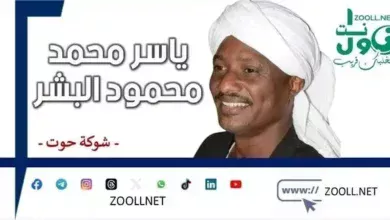The Effects of the Decision to Activate the Electronic Import Form (MI) System on the Market and National Security: (Challenges and Solutions) – Whispers of Letters – ✍️ Dr. Al-Baqir Abdul Qayyum Ali

Many people have prejudices against the Sudanese customs, considering that its designated director, General Salah Ahmed Ibrahim, made the decision to implement the certificate system (IM), which affected the passages in a general state of rickets and disrupted all customs. This case is an attempt on their part to demonize the man without fault, and what is known, necessarily, this case will harm the interests of those who are hidden and may cause damage to many traders. in prison, otherwise it will permanently remove them from the market. This is the case of Sudan. All decisions come suddenly and the consequences are not taken into account. It is as if the one who is subjected to the sword of this decision does not care about the state. at all.
However, I would like to clarify to those who are not satisfied with this decision of the Sudanese customs administration: that the customs is only an executive body responsible for implementing laws and regulations related to trade and customs taxes, and its main role is to implement policies issued by higher authorities such as the Presidency or the Ministry of Trade, and it does not have the power to legislate, and its basic mission is limited only to the control and inspection of goods, the collection of customs duties and the organization of import and export operations in accordance with current legislation.
The measure that has been taken includes preventing the clearance of any import transaction except through the electronic import form (IM), which means that banks cannot initiate any banking procedure or transfer foreign cash abroad for import purposes without submitting this form, and the aim of this measure is to regulate the market and reduce pressure on the parallel market by ensuring effective control of all import operations and means of payment, which protects available foreign exchange earnings.
This decision, whether negative or positive, was not issued by Customs, but by other bodies such as the Ministry of Commerce or the higher economic authorities, as an executive body, which are required to implement this decision, and to apply it literally in customs clearance operations, the aim being to ensure compliance with the new procedures that regulate import operations in accordance with government policies that control foreign exchange trade.
The customs institution, which plays an advisory role to the government, must provide advice and guidance to the state administration regarding these customs procedures, which are considered arbitrary because they came about suddenly and the supplier was not consulted about them or was not even informed of the situation. the date of their entry into force, and customs must explain the potential effects of these decisions of the public administration, it is necessary that they provide advice on how to implement the decision in a way that reduces its negative effects on traders and the market. general.
It is certain that this decision will negatively affect the interests of traders whose goods have arrived at ports and crossing points. It is the duty of customs to convey these concerns to the authorities concerned in order to clarify how to deal with these cases and to propose appropriate solutions to ensure that the clearance of goods that have already arrived is not disrupted.
As for the purchase of Libyan oil, I was talking about the term purchase and I did not use the term import, because the sale of this oil is done in local currency, and therefore it is necessary that (Libyan oil) be excluded from these procedures. which require the use of the electronic import form (IM). Which require transfers in foreign currency, excluding Libyan oil from this decision would be logical to avoid complicating import operations, and to avoid affecting supplies made by different financial methods, and this exception must be clarified by official guidelines in order to ensure that no problems arise when implementing the new procedures.
Since the purchase of Libyan oil does not affect hard currency reserves, its exclusion from the requirements of the electronic import form (IM) may be a justification to avoid any negative effects on the market or suppliers.
I want to issue a strong warning to the government, and the highest authorities must take this warning seriously: if Libyan oil is not exempted from all restrictions that facilitate its entry, suppliers will certainly turn to other alternatives, and these alternatives take it to Darfur, which will give the militia supply opportunities, which will strengthen its strength, and this matter could have undesirable repercussions on national stability and security.
The competent authorities must be aware of the procedures they are initiating and study all the repercussions that arise from such decisions that always come at inappropriate times, and the State must understand these problems in greater depth and try to find appropriate solutions to them as quickly as possible so that no harm is caused to citizens and to ensure the continuity of supplies without harming the economy or national security.
And God is behind the intention





